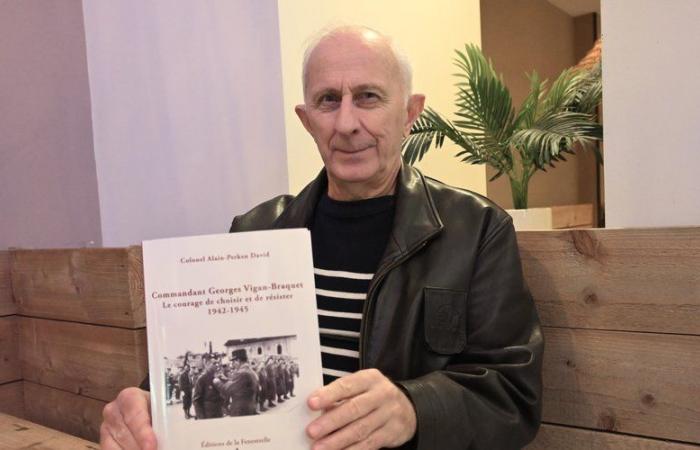
The commando which bears his name, leaving Bagnols-sur-Cèze on September 14, 1944, was the first integrated into the French army under reconstruction, “a brilliant idea”. For the release of his book, Alain David invites you to a talk on little-known facts about the resistance, at the Librairie Occitane in Bagnols, Friday November 8.
Events commemorating the 80th anniversary of the Liberation continue. The book Commander Georges Vigan-Braquet, the courage to choose and to resist (1942-1945) by Colonel Alain-Perken David has just been published, published locally by Éditions de la Fenestrelle. “I am accompanying this outing with talks for the municipalities that wish it until May 8”indicates the retired soldier. First meeting is given on Friday November 8 at the Librairie Occitane in Bagnols from 5 p.m. to 7 p.m., to discuss “some subjects not covered in the book, to demonstrate the crucial role of the commander and the commando in the constitution and regeneration of the French army”. It will also be about liberation and resistance in the Rhone Gard.
“No one knows the real impact of this story”
Indeed, when General De Lattre de Tassigny landed in Provence, his troops were exhausted. He arrived on August 29, 1944 in Bagnols for a command meeting.“we introduce him to Commander Vigan-Braquet. And there, I imagine the general saying to himself “I found it”. I am not sure but I think that the two men knew each other. De Lattre will do of the commando a model of integration of the FFI into the French army, that's what's great. The Vigan-Braquet commando is the first to integrate into the regular army. They will subsequently be 137,000 resistance fighters. being on the model of the Vigan-Braquet commando It's absolutely brilliant and no one knows the real impact of this story De Gaulle had the same idea at the same time, there was probably “an ether of common reflection”. While Leclerc will have the opposite reflex: not to integrate the resistance“.
For forty years the Colonel has followed in the footsteps of the Commander
Alain David is keen on history, he has 45 years of military culture, has read 200 works on the Second World War… His book, the result of ten years of research, is the first in a “Résistance Gard” trilogy on other singular and little-known historical facts. His destiny led him early in the footsteps of Commander Georges Vigan-Braquet. “I arrived in the sector in 1984 for the creation of the 1is Regsays Alain David. At the time, the regiment had no resources. The corps commanders told us to nomadize. Near Rochefort-du-Gard, I discovered Vigan-Braquet which has never left me for the last forty years.”
Alain David met the descendants of Georges Vigan-Braquet during the reconstitution ceremony (for which he was the military advisor) in Bagnols, on September 14. He gave them his book. “They are demanding because war heroes like their ancestor were not verbose with their children. With this book, I tell them what an officer he was. He is an intelligence man, a truly good officer, intelligent enough to lead his troops, and close to his men so that they obey in friendship. They united behind him.”
A second edition thanks to the archives kept by the descendants of the Commander
Like Georges Vigan-Braquet, Colonel David was in his element “within the troops”. “By being around him, we end up identifying ourselves…”confides the author who is already thinking about a second edition of this book which has barely been released: “I learned a lot by talking with the Vigan-Braquet family. They will lend me archives.”
France
Books





